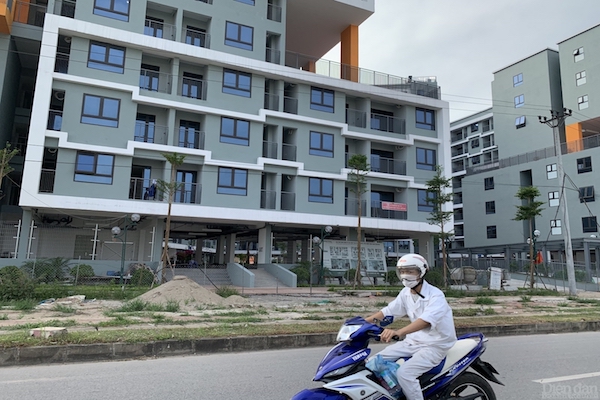Rethinking the bulk land planning strategy for social housing
Voters in Thai Nguyen province feel that the province's actual demand for social housing is minimal, resulting in land waste and issues managing the land budget designated for social housing development.

Low actual demand
Voters in Thai Nguyen province have submitted a proposal to provide land monies for social housing. Voters claim that Article 4, Clause 1 of Decree No. 49/2021/ND-CP dated April 1, 2021, by the Government revising and augmenting Article 5 of Decree No. 100/2015/ND-CP dated October 20, 2015, on the creation and administration of social housing, states:
In the case of commercial housing investment projects, urban areas with land areas of 2 hectares or more in special-type and type I urban areas, or 5 hectares or more in type II and type III urban areas, 20% of the total land area in detailed planning projects approved by competent authorities, with invested technical infrastructure systems for social housing construction.
According to this legislation, local governments must designate land funding for social housing development while developing comprehensive plans for some regional projects.
A practical survey, however, reveals that demand for social housing in provincial metropolitan areas is low, with a major section of the population unable to purchase or rent social housing. This has resulted in land waste and challenges administering the land fund set aside for the development of social housing.
As a result, voters in the province propose that the government consider flexible amendments to the content of Decree No. 49/2021/ND-CP dated April 1, 2021, to allocate land funds for social housing development in accordance with the real circumstances in localities.
In response to this proposal, the Ministry of Construction stated that it had studied and assessed some existing shortcomings and limit ations in the implementation of social housing development policies, including the requirement in Article 5 of the Government's Decree No. 100/2015/ND-CP dated October 20, 2015, to allocate 20% of land funds for social housing development. These results served as the foundation for researching, developing, and proposing Decree No. 49/2021/ND-CP to revise and augment several parts of Decree No. 100/2015/ND-CP in order to remedy these deficiencies.
However, in addition to the current limit ations and concerns addressed in the updated rules under the power of the government, properly resolving these issues may need modifying the Housing Law (under the jurisdiction of the National Assembly).
According to the Ministry of Construction, the draft Housing Law (amended) was submitted to the 15th National Assembly for assessment during its 5th session, with plans for adoption during the 6th session.
Article 80 of the draft proposes land for social housing development without requiring project investors in commercial housing and urban regions to give 20% of land for investment. Instead, it enhances laws that delegate responsibility for allocating land money for social housing projects to provincial-level People's Committees.
In particular, while developing and approving provincial plans, land use plans, building plans, and urban plans, provincial People's Committees must allot adequate land funds for social housing development in line with authorized programs and housing development plans.
Not as a trend
Following the approval of the 1 million social housing units project, several provinces and cities have urged for investment in thousands of social housing apartments to completely address the housing needs of low-income individuals, as previously reported by the Business Forum.

However, Mr. Nguyen Tho Tuyen, Chairman of the Board of Directors of BHS Real Estate Joint Stock Company (BHS Group), stated in press interviews that while social housing is very humane and necessary, it should not become a burden on society 10-15 years after use due to deterioration or inability to meet future needs.
Mr. Tuyen noted that the social housing trend is positive, but it may be oversaturated due to excessive supply and low actual demand (from those who are economically capable and ready to acquire social housing). This is particularly true in regions and cities other than Hanoi and Ho Chi Minh City.
As a result, he advised state agencies/project investors to perform extensive study (R&D) on demand in each location in order to ensure adequate supply. Each year, roughly 150,000 units must be liquidated in order to build and consume all 1 million social housing units by 2030, which is a large figure.
"The most important step toward achieving this goal is to increase demand by relaxing criteria related to target buyers (household registration, income), transfer conditions, and mortgage interest rates." Create absolute circumstances for procedures, capital, and methods for investors at the same time, because social housing is unlikely to be a piece of cake," Mr. Tuyen added.
Meanwhile, Dr. Su Ngoc Khuong believes that it is critical to proactively speed project approval and execution in order to minimize costs, make housing more cheap, or use state-managed land money to construct projects that offer inexpensive products.
"At the moment, we are putting everything on the banks, and I believe that this tool is insufficient." Even if interest rates are decreased to 4 - 5%, there will be significant dispute," Mr. Khuong noted.
Many experts believe, numerous tools from relevant parties should be utilized to collaboratively tackle the problem, since employing separate tools for managing a city or a specific solution alone would make meeting the objective of 1 million housing units by 2030 impossible.








